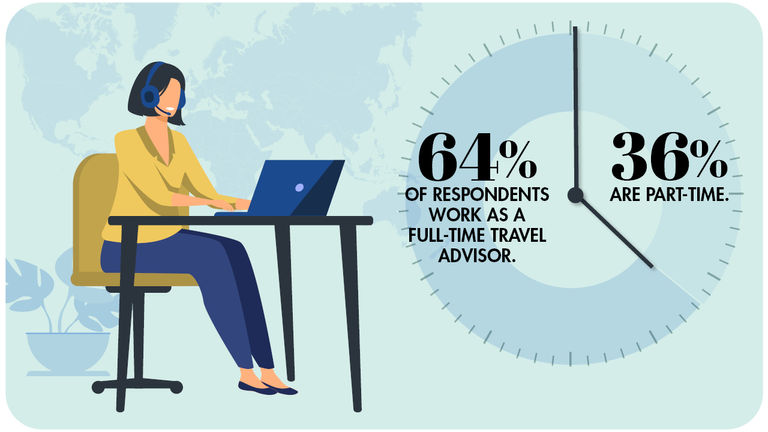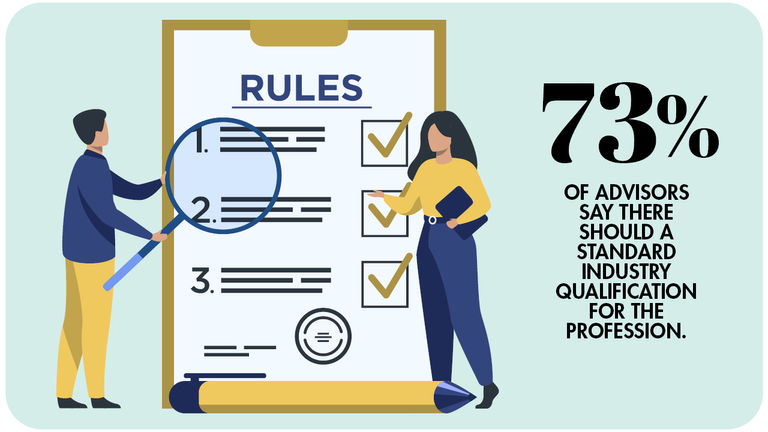Despite a well-documented influx of people entering the travel advisor profession, most agents are dedicated full-time professionals, according to new research that’s part of TravelAge West’s Need to Know series.
Full-Time or Part-Time Travel Agent?
In a survey of more than 250 advisors, nearly two-thirds (64%) say they are full-time agents, while 36% sell travel part time. In addition, for 43% of full-time advisors, selling travel accounts for 90% of their annual income. For part-time advisors, the same percentage (43%) say travel sales make up less than 10% of their income.
 Sixty-four percent of respondents identify as full-time travel advisors.
Sixty-four percent of respondents identify as full-time travel advisors.
Credit: 2023 TravelAge West
"I work as a travel advisor as my full-time job,” said Cali Stein, a luxury travel advisor with Embark Collective. “It’s not just a job though, it’s my career, and it has somewhat taken over my whole life, but in the very best way. Personally, doing this full time has allowed me to really dive in and learn as much as possible, travel when I need to and make the connections that help me to be the best advisor I can be.”
It’s not just a job though, it’s my career, and it has somewhat taken over my whole life, but in the very best way.
What Does the Industry Think of Part-Time Travel Agents?
The majority of advisors (61%) entered the profession as full-time workers, and most respondents (57%) don’t feel there is any stigma against part-time advisors.
Concerns related to part-time advisors are mixed: 24% feel that these agents might not have enough product knowledge; 21% worry about their lack of professionalism/dedication; 10% think part-time advisors might not adequately serve their clients; and 8% are concerned that part-time advisors give all agents a bad name.
However, more than a third of respondents (37%) have no concerns at all about part-time advisors and 75% say they have never dealt with a troubling situation related to this kind of agent.
"I don’t feel that the industry looks down on advisors who work part time,” Stein said. “In my experience, hoteliers and suppliers are happy to get the business no matter who it comes from.”
In general, most respondents feel that there are not enough travel advisors overall in the travel industry — 57% think the industry can use more agents.
 The majority of travel agents believe the industry needs more travel advisors.
The majority of travel agents believe the industry needs more travel advisors.
Credit: 2023 TravelAge WestThe majority of respondents (56%) do not personally know anyone who has recently become an advisor.
I knew that transitioning into being an advisor meant starting my own business, and I knew that required 100% of my time and devotion.
Three-fourths (75%) of survey takers feel that the most important educational topic for prospective advisors is basic information on what a travel advisor does. This is compared to the next largest responses: 8% who feel new advisors should learn about different business models and 7% who think information on generating sales is most important.
Interestingly, a strong majority of respondents (73%) think there should be a standard industry qualification for the travel advisor profession (similar to a real estate license).
 Seventy-three percent of travel advisors believes there should be a greater barrier to entry.
Seventy-three percent of travel advisors believes there should be a greater barrier to entry.
Credit: 2023 TravelAge West“I never actually worked part time as an advisor when I first started,” Stein said. “I knew that transitioning into being an advisor meant starting my own business, and I knew that required 100% of my time and devotion. As a full-time advisor, 100% of my yearly income comes from selling travel, and I still can’t believe that I make money from doing what I love.”
Need to Know Survey Series
“Need to Know” is a research series from TravelAge West that tracks the responses of advisors as they relate to various travel trends and topics. This survey recorded the responses of 251 advisors across the U.S. Click here to see more Need to Know stories.